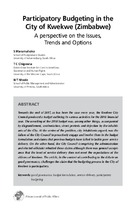| dc.contributor.author | Marumahoko, Sylvester | |
| dc.contributor.author | Chigwata, Tinashe Calton | |
| dc.contributor.author | Nhende, Norman | |
| dc.date.accessioned | 2019-08-19T05:34:48Z | |
| dc.date.available | 2019-08-19T05:34:48Z | |
| dc.date.issued | 2018 | |
| dc.identifier.citation | Marumahoko, S. Chigwata, TC. and Nhede, NT. (2018). 'Participatory Budgeting in the City of Kwekwe (Zimbabwe): A perspective on the Issues, Trends and Options'. African Journal of Public Affairs. 10(4): 196 - 211. | en_US |
| dc.identifier.uri | http://hdl.handle.net/10566/4789 | |
| dc.description.abstract | Towards the end of 2017, as has been the case every year, the Kwekwe City Council produced a budget outlining its various activities for the 2018 financial year. The unveiling of the 2018 budget was, among other things, accompanied by disgruntlement, confrontation, street protests and dejection by the inhabitants of the City. At the centre of the problem, city inhabitants argued, was the failure of the City Council to proactively engage and involve them in the budget formulation and claims that previous budgets have failed to tackle poor service delivery. On the other hand, the City Council (comprising the administration and elected officials) rebutted these claims although there was general acceptance that the level of service delivery does not meet the expectations of the citizens of Kwekwe. The article, in the context of contributing to the debate on good governance, challenges the claim that the budgeting process in the City of Kwekwe is participatory. | en_US |
| dc.language.iso | en | en_US |
| dc.publisher | African Journal of Public Affairs | en_US |
| dc.subject | Good governance | en_US |
| dc.subject | Budget formulation | en_US |
| dc.subject | Service delivery | en_US |
| dc.subject | Participatory budgeting | en_US |
| dc.title | Participatory Budgeting in the City of Kwekwe (Zimbabwe) A perspective on the Issues, Trends and Options | en_US |
| dc.type | Article | en_US |

